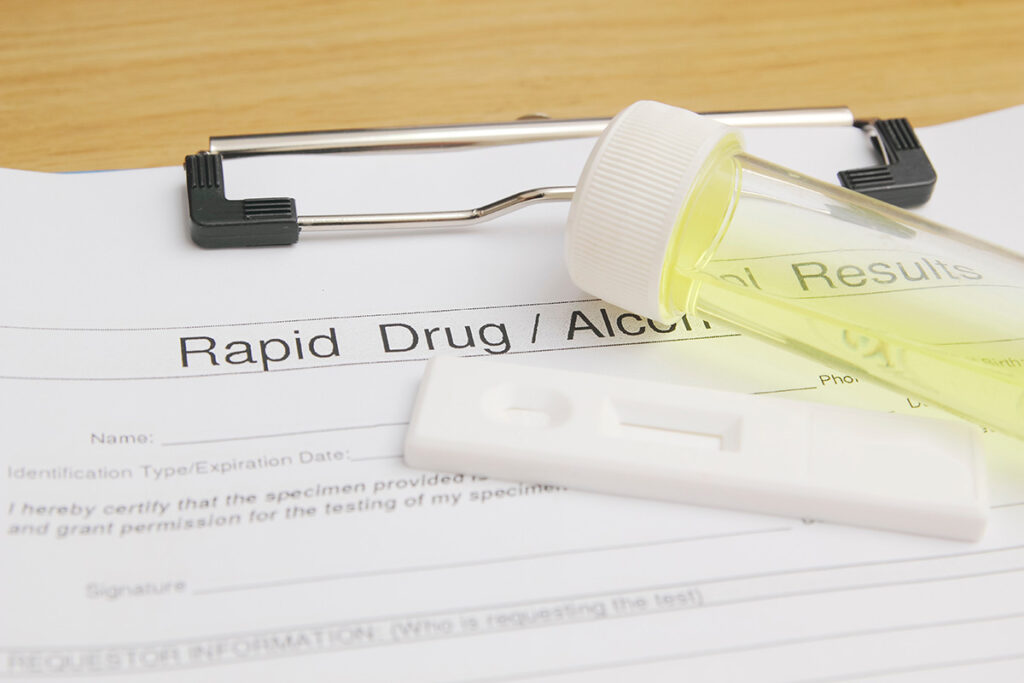Alcohol EtG testing reliably detects recent alcohol consumption by measuring ethyl glucuronide (EtG) in the body. This marker remains in urine longer than alcohol, making it a valuable tool for monitoring abstinence in those undergoing alcohol dependence treatment. Alcohol addiction can be challenging to navigate and manage, but EtG testing can provide a clear picture of an individual’s recent drinking habits.
At Woodland Recovery Center’s alcohol addiction treatment, we provide clients with evidence-based treatment, personalized care, and support to achieve long-term sobriety. Our comprehensive approach includes regular EtG testing to track progress and ensure accountability. Call us at 662.222.2989 today to learn about EtG alcohol testing.
What Is Alcohol EtG Testing?
Alcohol EtG testing is a method used to detect the presence of ethyl glucuronide, a direct metabolite of ethanol, in the body. EtG is produced when the liver processes alcohol, and its presence in urine, blood, or hair indicates recent alcohol consumption.
Unlike traditional alcohol tests that measure the level of alcohol in the bloodstream at a given moment, EtG testing can detect alcohol ingestion even after it has been metabolized and eliminated from the bloodstream.
This extended detection window, which can range from a few days to several weeks depending on the individual’s usage patterns and the testing method, makes EtG testing a reliable tool for monitoring compliance with sobriety programs or legal requirements.
Types of Alcohol Tests
There are several different types of alcohol tests. These tests are meant to detect some form of alcohol throughout the body. We will go over three of them: breathalyzer tests, blood alcohol tests, and EtG tests.
Breathalyzer Tests
Breathalyzer tests are the most common type of alcohol test, often used by law enforcement during traffic stops or checkpoints. These tests measure alcohol concentration in a person’s breath and provide an immediate result. However, they have a limited detection window and can only detect recent alcohol consumption.
Blood Alcohol Testing
A blood alcohol test will measure the amount of alcohol in a person’s blood. The main ingredient in alcohol is ethanol, and when an alcoholic beverage is consumed, the ethanol is absorbed into the bloodstream. The liver then processes the ethanol, which takes about one hour per drink. These tests are used to determine:
- Legal intoxication – Blood alcohol concentration (BAC) of 0.08% or higher is considered legally intoxicated in most states.
- Impairment – Some states may use blood tests to measure a person’s level of impairment for DUI charges.
During a blood alcohol test, a healthcare professional will take a blood sample from your arm. While getting your blood drawn won’t take too long, getting the results of blood alcohol testing can take up to several weeks. While this testing is more accurate than a breathalyzer test, it is much less convenient.
Alcohol EtG Testing
EtG testing, as mentioned earlier, detects the presence of ethyl glucuronide in urine, blood, or hair. This type of test is non-invasive and can detect even small amounts of alcohol consumption within a more extended period than traditional tests. EtG testing has become an essential tool for substance abuse treatment programs to monitor compliance and ensure sobriety in those recovering from alcohol addiction.
An EtG test is the most accurate test, as EtG can be detected within someone’s urine for about two days or 48 hours. If the drinking is heavier, it can be detected for up to three days or 72 hours. While this is the most accurate form of testing, it still has certain drawbacks.
EtG is unable to find out how much alcohol someone has been drinking, but higher levels tend to indicate higher alcohol consumption. Different factors can influence this. For instance, if a significant time has passed since the last alcohol use, EtG levels will be much lower. There is also a limit to how much EtG can be detected. EtG tests detect any drinking, not just heavy drinking, so drinking above the detectable limit won’t raise those levels. This is known as the “ceiling effect.”
Benefits of Alcohol EtG Testing
Alcohol EtG testing provides several significant advantages that make it an indispensable tool in addiction treatment and monitoring programs. Here are some of the key benefits:
- Extended detection window – EtG remains in the body long after the effects of alcohol have worn off, allowing detection of alcohol consumption from days to weeks.
- Non-invasive – Unlike blood tests, EtG testing typically involves urine samples, which are easy and painless to collect.
- Increased accuracy – By measuring a direct metabolite of alcohol, EtG tests can more accurately detect recent alcohol use compared to breathalyzer tests.
- Accountability and compliance – Regular EtG testing helps ensure individuals stay accountable in their recovery journey, providing a clear measure of sobriety.
- Support for treatment plans – The results from EtG testing can help tailor treatment plans more effectively, ensuring personalized care and intervention.
These benefits collectively enhance healthcare providers’ ability to support individuals on their path to long-term sobriety and better manage their recovery progress.
Call Woodland Recovery Center for Alcohol Addiction Treatment
Taking the first step toward sobriety can be daunting, but you don’t have to do it alone. At Woodland Recovery Center, our compassionate team is here to support you every step of the way. We utilize advanced tools such as Alcohol EtG testing to monitor your progress and ensure you stay on track with your recovery plan. This testing method provides a reliable window into your recent alcohol consumption, helping to enhance the effectiveness of your personalized treatment.
If you or a loved one is struggling with alcohol addiction, don’t wait to seek help. Call Woodland Recovery Center today at 662.222.2989 or contact us online to learn more about our comprehensive alcohol addiction treatment program and begin your journey toward a healthier, sober life.



